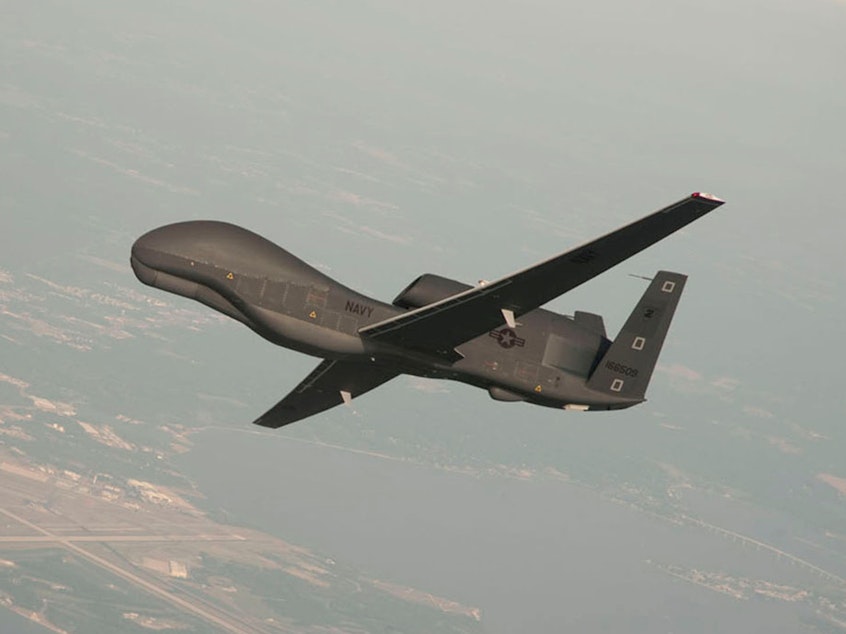Iran Shoots Down U.S. Spy Drone; CENTCOM Says It Was In International Airspace

Updated at 10:15 a.m. ET
Iran's Revolutionary Guard announced Thursday that it had shot down a U.S. drone over its territory to send "a clear message" to America, but a U.S. official tells NPR that the targeted unmanned aircraft was operating in international airspace.
Iran's Islamic Revolutionary Guard Corps said Thursday that it downed an RQ-4 Global Hawk surveillance drone that had entered Iranian airspace around Kouhmobarak district in country's south, near the Gulf of Oman.
"Iranian reports that the aircraft was over Iran are false," U.S. Central Command spokesman Navy Capt. Bill Urban said Thursday. "This was an unprovoked attack on a U.S. surveillance asset in international airspace."
Gen. Hossein Salami, the IRGC commander, was quoted by The Associated Press as saying Iran does "not have any intention for war with any country, but we are ready for war."
Sponsored
Responding to news of the shootdown, President Trump said via Twitter, "Iran made a very big mistake!"
U.S. Central Command says Iran used a surface-to-air missile system to shoot down the U.S. Navy Broad Area Maritime Surveillance ISR (for intelligence, surveillance and reconnaissance) aircraft. It says the drone was operating in international airspace over the Strait of Hormuz when it came under fire at approximately 11:35 p.m. GMT late Wednesday.
According to Urban, the downed drone is an RQ-4A Global Hawk, the Navy's version of the high-altitude, long endurance aircraft that performs intelligence and surveillance missions "over vast ocean and coastal regions."
Earlier this week, the Pentagon said Iran had attempted to shoot down a U.S. drone. It also acknowledged the successful shooting down of an MQ-9 Reaper drone on June 6 by Yemen's Houthi forces, which are allied with Iran. The U.S. said Iran helped the Houthis bring down the pilotless aircraft.
Military.com describes the Global Hawk as an unarmed craft used for intelligence-gathering missions. The vehicle reportedly has a top speed of nearly 355 mph and a range of 10,000 miles.
Sponsored
The area where Iran says the drone went down is near where the U.S. claims Iran attacked two oil tankers last week. Iran has repeatedly denied being involved in that attack.
The attack on the drone comes at a time of heightened tensions between the U.S. and Iran, with not only the alleged attacks on the tankers, but with Iran threatening to step up its nuclear activities and the U.S. working to exert maximum pressure through economic punishments.
Last year, the Trump administration reimposed sanctions on Tehran after abruptly withdrawing from a 2015 multinational agreement to limit Iran's nuclear program.
Despite Washington's withdrawal, the Joint Comprehensive Plan of Action, or JCPOA, technically remains in force with the other signatories — besides Iran, the other four permanent members of the U.N. Security Council and the European Union.
However, earlier this week, a spokesman for Iran's atomic energy agency warned that Tehran would surpass limits on its uranium stockpile under the deal and said it was prepared to increase its enrichment to a level just one step short of weapons-grade, which also violates the terms of the agreement.
Sponsored
Also, Houthi rebels in Yemen on Wednesday said they hit a Saudi power station with a cruise missile. White House spokesperson Sarah Sanders said President Trump had been "briefed on the reports of a missile strike in the Kingdom of Saudi Arabia."
"We are closely monitoring the situation and continuing to consult with our partners and allies," Sanders added. [Copyright 2019 NPR]
